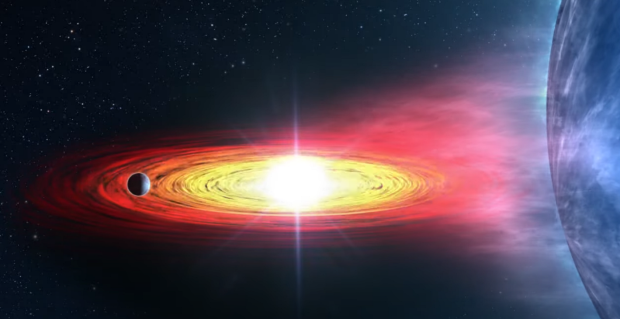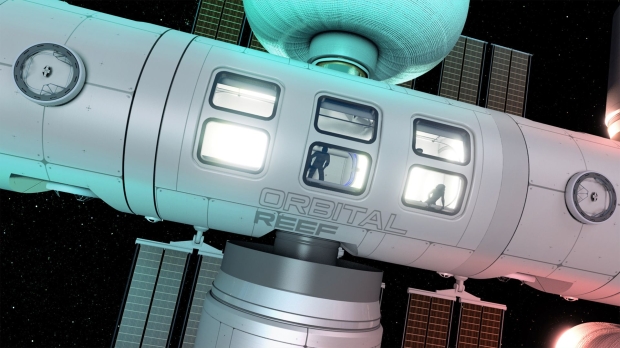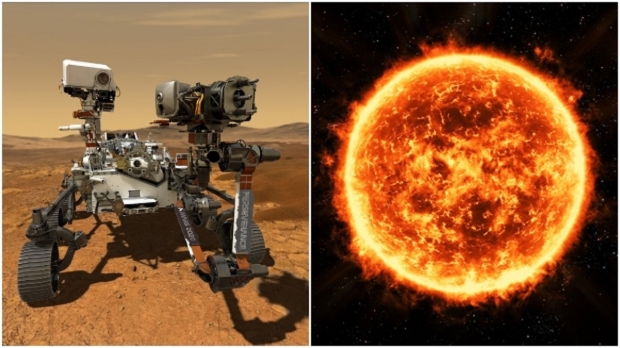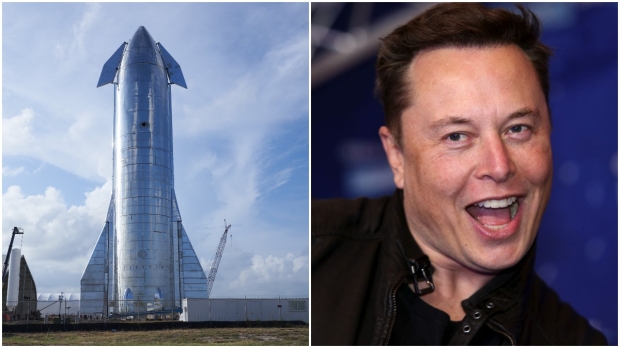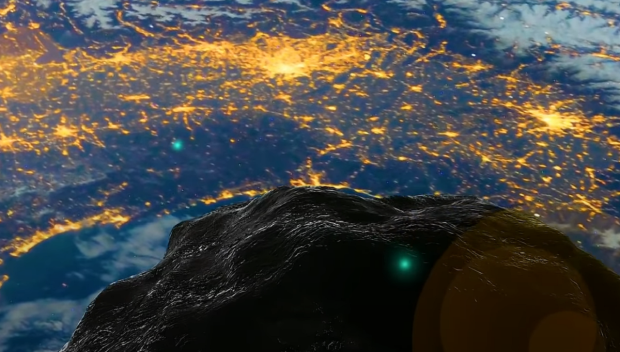Science, Space, Health & Robotics News - Page 254
First planet outside of our galaxy may have just been discovered
A team of astronomers has claimed that they may have detected the first planet outside of our Milky Way galaxy.
The study from the researchers has been published in Nature Astronomy and details a possible exoplanet candidate that resides in the spiral galaxy Messier 51 (M51), or Whirlpool Galaxy, located 28 million light-years away. The astronomers used NASA's Chandra X-ray Observatory that specializes in observing celestial objects in X-rays and used the transit technique to observe the possible exoplanet.
]The transit technique is quite simple to understand - imagine looking at a star and then seeing a drop in its brightness. From this drop you can infer that a celestial body is orbiting the star and has passed in between the observational line drawn from the telescope to the star. This technique is widely used by astronomers searching for exoplanets in optical light, but is rarely used by astronomers using X-ray-based telescopes.
Continue reading: First planet outside of our galaxy may have just been discovered (full post)
Blue Origin announces a new space station to 'normalize spaceflight'
The International Space Station is nearing its end of life, but before it's retired, it will be joined by a new space station called Orbital Reef.
The announcement comes from Blue Origin, Boeing, Sierra Space, and a few other companies who plan on launching the new space station that will have the facilities to support interests from national governments, the private industry, and tourism. According to Brent Sherwood, the senior vice president of advanced development programs for Blue Origin, Orbital Reef will lower the cost, expand access and provide the services needed to normalize spaceflight.
Sherwood said, "We will expand access, lower the cost, and provide all the services and amenities needed to normalize spaceflight. A vibrant business ecosystem will grow in low Earth orbit, generating new discoveries, new products, new entertainments and global awareness." The announcement states that Orbital Reef will be up and running with operational capabilities by the late 2020s. If you are interested in reading more about this announcement, check out this link here.
Continue reading: Blue Origin announces a new space station to 'normalize spaceflight' (full post)
Earth's spin slowed down, we may need to add a 'negative leap second'
Officials are saying that we may have to add a "negative leap second" onto the official Universal Coordinated Time (UTC).
UTC is the international method for timekeeping and is based on the atomic clock that is the epitome of precision as it measures the time by the movement of electrons in atoms, hence its "atomic clock" name. Officials that operate the atomic clock look for differences between Earth's rotation speed in time, which averages out to be 86,400 seconds per day, versus what the atomic clock states.
When there is a discrepancy between the atomic clock and Earth's rotation speed, the atomic clock is adjusted, and its recorded down whether Earth's rotation speed has sped up or slowed down. For example, in 2016, a leap second was added at 23 hours, 59 minutes, and 59 seconds on Dec. 31. Officials have been adding leap seconds around every 18 months since 1972, but now reports are indicating that Earth's rotation speed has slowed down, which means that a second may have to be subtracted from the atomic clock, something that is known as a "negative leap second".
Continue reading: Earth's spin slowed down, we may need to add a 'negative leap second' (full post)
Hubble bare-witnesses the 'cataclysmic demise' of a star's fiery death
NASA's Hubble Space Telescope, along with astronomers have seen for the first time the moments just after a star ended its life in a fiery explosion.
The new study has been published in the Monthly Notices of the Royal Astronomical Society and details observations made of the star's supernova, now dubbed SN 2020fqv. Researchers are now calling the supernova observation the "Rosetta Stone of supernovas", which is a reference to the Rosetta Stone that features the same text in three different languages. The stone was used by historians to understand Egyptian hieroglyphs.
Now, astronomers, with their newly-found observations, will be able to use the data recorded by Hubble to gain a deeper understanding of the nature of supernovas and what happens within a star right before it's about to explode. Hubble's observations took place only a few hours after the explosion had occurred, which allowed for researchers to observe the material close to the star after the explosion.
Continue reading: Hubble bare-witnesses the 'cataclysmic demise' of a star's fiery death (full post)
Every Mars rover was forced to shut down until now
All of the rovers that are currently station on the Red Planet were forced into safe mode for a two week period, but now they are back online.
NASA, along with the China National Space Administration (CNSA) had no choice but to switch their rovers into "safe mode" for two weeks as Earth and Mars reached opposite sides of the Sun. This two week period is called a "solar conjunction", and its when Earth and Mars are obscured from each other by the Sun, meaning researchers and engineers will lose sight of Mars, and thus communications.
Now that period has passed, nominal operations for all of the rovers have resumed, meaning research is back underway. Operations for NASA's Perseverance rover officially came back online on October 19, and immediately the rover began traversing the martian landscape in search of new interesting prospects. During this down period, all rovers, including China's Zhurong rover were collecting valuable data while in safe mode. For more information on this story, check out this link here.
Continue reading: Every Mars rover was forced to shut down until now (full post)
Elon Musk teases SpaceX's Starship may launch earlier than expected
SpaceX's Starship launch vehicle has recently passed a major hurdle in its construction, and now SpaceX CEO Elon Musk has teased its launch may happen earlier than expected.
On October 21, SpaceX successfully completed a static fire test with its SN20 Starship prototype, and this static fire test is no small achievement as preparations are being made for its first orbital flight test. SpaceX has previously said that Starship's first orbital test flight would likely occur within a couple of months or before the end of the year, but now SpaceX CEO Elon Musk has teased via Twitter that the test flight could occur next month.
At the moment, the launch of SpaceX's largest orbital vehicle is "pending regulatory approval" from the US Federal Aviation Administration (FAA), which is essentially an official license that grants SpaceX approval to launch the new vehicle. Musk took to Twitter on October 22 and said, "If all goes well, Starship will be ready for its first orbital launch attempt next month, pending regulatory approval." Patience and timing are the two things the public and SpaceX must now wait for as the space transportation company gears up for its biggest launch yet.
Continue reading: Elon Musk teases SpaceX's Starship may launch earlier than expected (full post)
NASA announces date for when it begins its journey back to the Moon
Yesterday, NASA officially announced when it will begin the first mission of its Artemis lunar program that aims to take humans back to the Moon as early as 2024.
On October 20, engineers successfully stacked the crew capsule on top of the Space Launch System (SLS) rocket that is slated to be the means of transportation to the Moon. The first step on getting humans back on the Moon is Artemis 1 - an uncrewed mission that will test the Orion spacecraft, the SLS rocket and ground systems at Kennedy Space Center in Cape Canaveral, Florida. Artemis 1 will send the Orion spacecraft 280,000 miles from Earth - farther than any human spacecraft has ever flown before.
Throughout its journey, the NASA spacecraft will separate from the Interim Cryogenic Propulsion Stage (ICPS) about two hours after launch and begin deploying small satellites over several days called CubeSats, which will be used to perform several experiments and technology demonstrations. On its way to the Moon, engineers on the ground will be testing all of Orion's systems to make sure everything is operational for when humans embark.
Continue reading: NASA announces date for when it begins its journey back to the Moon (full post)
'First-ever free flying commercial space station' locks in launch date
Nanoracks, along with partnering companies, has announced the launch date window for its first-ever free-flying commercial space station named Starlab.
Starlab is set to become the world's first free-flying commercial space station, which means that it won't be locked into one orbit position, separating itself from the likes of the International Space Station. The new space station will feature a 12,000 cubic feet habitat module that will have the capacity to house four astronauts. Additionally, Starlab will feature a laboratory to conduct research, a large external robotic arm for servicing payloads and cargo, as well as a payload capacity of 776 cubic feet - similar to the ISS.
Jeffrey Manber, CEO, and Co-Founder of Nanoracks, said in the press release, "Since the beginning, Nanoracks has sought to own and operate a private space station to fully unlock market demand. Our team has spent the last decade learning the business of space stations, understanding customer needs, charting market growth, and self-investing in private hardware on the ISS like the Bishop Airlock. Nanoracks and our team are excited to work with NASA and our friends across the world as we move forward with Starlab."
Continue reading: 'First-ever free flying commercial space station' locks in launch date (full post)
Here's why you should be terrified for NASA's newest space telescope
NASA has released a new video that details the launch of its highly-anticipated James Webb Space Telescope - the telescope that is said to replace the Hubble Space Telescope.
NASA and many contractors have been working on the JWST for many years and have experienced numerous delays attributed to technology challenges, the COVID-19 pandemic, and many other issues. But now, the space agency is nearing the end of the road for the telescope as it gears up for launch.
In the new video posted to the JWST YouTube channel, Webb's Mission Lead System's Engineer, Mike Menzel, explains that Webb has "300 single-point failure items, and they all have to work right. When you're a million miles from the Earth, you can't send someone to fix it".
Continue reading: Here's why you should be terrified for NASA's newest space telescope (full post)
NASA scientist answers, 'What if an asteroid were going to hit Earth?'
NASA has posted a new video to its YouTube channel that's a part of its "We Asked a NASA Scientist" series that aims at answering some of the public's most popular questions about space.
In this week's episode, NASA scientist and planetary defense expert Dr. Kelly Fast answers, "What if an asteroid were going to hit Earth?". Dr. Kelly explains that there are currently no known threats to Earth asteroid-wise, but that doesn't mean that we shouldn't pay attention to asteroids as an asteroid impact is the "only natural disaster that can be prevented".
For this reason, NASA set up the Planetary Defense Coordination Office keeps which keeps a lookout for asteroids that pose any risk to Earth by calculating their trajectories and where they will end up in the future. Dr. Kelly says that if an asteroid is found to pose a danger to Earth, then a "deflection mission might be possible". Recently, a team of researchers proposed sending explosive rods to collide with an asteroid if one was calculated to impact Earth. If you want to know more about that story, check out this link here.
Continue reading: NASA scientist answers, 'What if an asteroid were going to hit Earth?' (full post)


